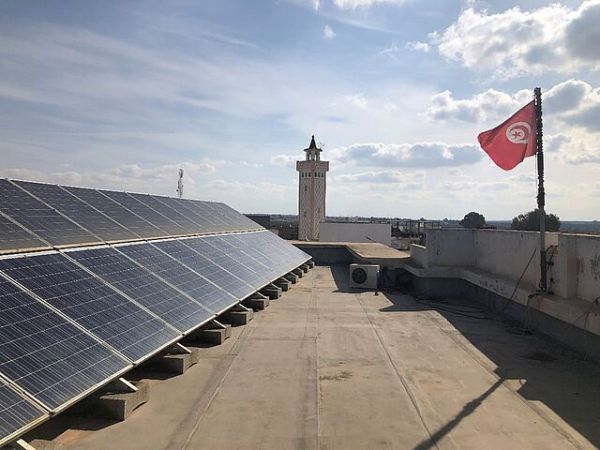Tunisia project focused on clean energy in buildings completes joint study on distributed solar and energy efficiency best practices to support decarbonisation

Disclaimer: This news piece was authored by the NAMA Support Project (NSP) “Tunisia – Scaling-up Renewable Energy and Energy Efficiency in the Building Sector”.
The NSP “Scaling-up Renewable Energy and Energy Efficiency in the Building Sector” (or “Tunisia – Clean Energy in Buildings for short) aims at increasing the uptake of energy efficiency and renewable energy measures across the building sector in Tunisia through the scaling-up of three national subsidy programmes (PROSOL, PROSOL ELEC Économique and PROMO ISOL).
In a recent study on renewable energy policies, the NSP (also referred in the study as “Building NAMA”) collaborated with a research team from the John Hopkins University. The team contextualised the approach Tunisia has taken thus far to further deploy distributed solar and energy efficiency measures in the buildings sector by examining various residential and non-residential use cases. The study aimed to glean best practices and approaches that could be leveraged or used, within the Tunisian context, to further its decarbonisation goals.
Specifically, the team performed an in-depth contextualisation exercise evaluating the best practices and policies that four countries in North Africa, Southeast Asia, North America and Europe have taken to deploy residential solar. The team used these case studies to collect insights for a potential Tunisian approach. Additionally, the team evaluated various non-residential use cases for solar in Tunisia and created a case ranking system to understand and compare the feasibility of each use case (in addition to policy mechanisms relevant to each case).
Several takeaways have emerged from the residential section that could hold relevance and impact for Tunisia. From Egypt, the promotion of solar energy kits could, if done correctly, provide additional deployments of solar energy while meeting a certain customer demographic that otherwise would be unable to install rooftop solar. Additionally, the recommendation to develop a program to strengthen the local EPC market would greatly support the distributive solar market and increase its overall deployments. Finally, the creation of an official solar website that vets and lists installation companies would help decrease information barriers to household solar deployments while consistently maintaining quality standards.
Morocco’s case provides specific lessons learnt in policy options and financing mechanisms for energy efficiency measures, including building codes, regulations and public-private partnership approaches in energy efficiency projects that would be relevant for Tunisia. The residential solar rooftop sector is relatively nascent in Morocco with fewer applicable lessons for Tunisia. The example in Vietnam provides a case study in both the growth potential and limitations of broad-based electricity sector incentives (as opposed to targeted residential ones) and the role of unique, context specific, financing schemes to accelerate decentralised solar deployment. The examples in California, USA and Germany presented how strong economic incentives for households and advanced experience in financing mechanisms and expertise preparation were in place before implementation. Overall, the four countries analysed had several successful initiatives and policies that could prove both beneficial and effective were they to be implemented in Tunisia.
The non-residential use cases were ranked from one (lowest) to three (highest) across three metrics. These metrics were the potential market size of the use case, the customer ability to adopt solar technology and the applicability to the Tunisian context. The average total rank, out of nine, was 6.3 representing notably favourable conditions for non-residential use cases in Tunisia. The top three highest ranked use cases were mosques (8/9), municipal and governmental buildings (8/9) and hotels/tourism (7.5/9). Based on the designed ranking system, these three use cases represent the most feasible and impactful for Tunisia.
For mosques the main business models suggested are government procurement, self-ownership or community ownership with the source of funds coming from government grants, crowdfunding or subsidised loans. For government buildings the primary business models recommended are solar leases or government procurement, with the source of funds being from government grants or subsidised loans. For hotels/tourism the main business models being recommended are self-ownership or leases with the source of funds coming from a bank loan or direct financing. Commercial/Industrial applications for distributed solar also offer significant potential in Tunisia yet require more substantive regulatory or third-party support to de-risk the investment climate. As for cross-cutting recommendations, the study highlights the role of financial incentives across the solar PV value chain (from developers to consumers) and discusses specific implementation strategies. It also provides specific guidance on sectoral reform in the utility and building sectors. Overall, the study provides a holistic set of recommendations to scale rooftop solar in Tunisia.
Read the full study in the Knowledge & Learning Hub.
The NAMA Facility is a joint initiative of the German Federal Ministry for Economic Affairs and Climate Action (BMWK), UK’s Department for Business, Energy and Industrial Strategy (BEIS), the Danish Ministry of Climate, Energy and Utilities (KEFM), the Danish Ministry of Foreign Affairs (MFA), the European Union and the Children’s Investment Fund Foundation (CIFF).
